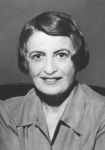
Ayn Rand was born in St. Petersburg, Russia, on February 2, 1905. From an early age, Rand was interested in philosophical questions and fiction writing. She decided to become a novelist at the age of nine and dedicated herself to writing from that point on. Later she studied philosophy and history at the University of Petrograd, graduating in 1924 at the age of twenty. Rand left Soviet Russia for the United States in 1926, determined never to return. She settled in Hollywood, where she hoped to write for the silent screen until she was proficient enough in English to turn to novels. Rand soon found work as a junior screenwriter for DeMille Pictures. It was here that she also met Frank O’Connor, the man who would be her husband for fifty years.
In 1932, after years of struggle, Ayn Rand sold her first screenplay, “Red Pawn,” and saw her first stage play, Night of January 16th, produced in Hollywood and then on Broadway. Her first novel, We the Living, was published in 1936, after two years of publisher rejections. This was followed by the 1938 publication of Anthem, a novelette about a society so mired in collectivism that even the concept “I” has been lost.
Rand began The Fountainhead—the novel that would make her famous—in 1935, though it would take seven years for completion. Rand described the theme of The Fountainhead as “individualism versus collectivism, not in politics but in man’s soul.” In the character of the architect Howard Roark, she presented the kind of hero whose depiction was the chief goal of her writing: the ideal man, man as “he could be and ought to be.” When published in 1943, The Fountainhead made history two years later by becoming a best seller through word of mouth, and gained for its author lasting recognition as a champion of individualism.
Rand returned to Hollywood in late 1943 to write the screenplay for The Fountainhead, but wartime restrictions delayed production until 1948. She began her magnum opus, Atlas Shrugged, in 1946, working full time on the novel until its publication in 1957. The theme of Atlas Shrugged is the role of the mind in human life. It dramatizes Rand’s unique philosophy in the form of an intellectual mystery, integrating ethics, metaphysics, epistemology, politics, economics, and sex. Her last work of fiction, Atlas Shrugged stands as Rand’s greatest artistic achievement.
Thereafter until her death, Ayn Rand wrote and lectured extensively on her philosophy, Objectivism, which she characterized as “the concept of man as a heroic being, with his own happiness as the moral purpose of his life, with productive achievement as his noblest activity, and reason as his only absolute.” Rand was often invited to speak on college campuses, drawing capacity crowds at Yale, Princeton, Brown, Columbia, West Point and others. Her first lecture at Boston’s Ford Hall Forum, where she would return regularly until the end of her life, took place in March 1961. She appeared frequently on radio and television, including prominent television programs such as The Mike Wallace Interview, The Tonight Show Starring Johnny Carson and The Phil Donahue Show. In addition to her public speaking engagements, Rand published three different subscription periodicals from 1962 to 1976; many of the essays that appeared in those periodicals were later reprinted in nonfiction works such as The Virtue of Selfishness and Capitalism: The Unknown Ideal.
Ayn Rand died on March 6, 1982, in her New York City apartment. All of her original works remain in print, which, combined, have sold more than thirty-seven million copies. Numerous works about Ayn Rand or containing original material produced by her have been published posthumously.
Copyright © 2020 Anthem Foundation for Objectivist Scholarship. All rights reserved. Reproduction in whole or in part is prohibited. The Anthem Foundation for Objectivist Scholarship is a 501(c)(3) nonprofit organization.
Contributions to the Anthem Foundation in the United States are tax-exempt to the extent provided by law.